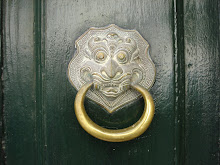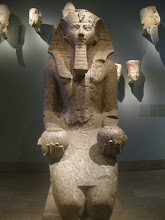
There's a crack in the UN building. Just at the base, in the window pane. I saw it yesterday, and acquired evidence today:
As you can see in the background of this picture, the flags are down. I never thought of it before, but I guess they must take them down every day around 5 pm. Can you imagine having to wake up at the crack of dawn every day and hoist 192 flags in time for when all the civil servants start their day at around 8 or 9, only to go and take each and every one of them down again a few hours later?
Every day.
Poor guy.
Yeah, I know. But anyway, I noticed the crack on my way out of the Secretariat building yesterday after work, and immediately my mind started making all kinds of connections. Or actually mostly one, and it went something like this:
"Hmm. Could it be that this crack at the base of the UN Headquarters is a symptom of the state of the Organization?"
And in my ear-popped state (
you try going down from the 37th floor in an elevator that might stop at one or two other floors in the thirties, but always goes directly from 28 to 1 (there are other elevators serving the other floors) at a stomach-turning speed, without having the change in pressure seriously affect your hearing) I was walking out to the avenue thinking about this. The symbolic crack, not my ears.
See, some people asked me that before I came here. If I thought that the UN would continue to exist for much longer, considering how weak it is, and how little it does, and how certain super powers don't think so highly of it and all. And yes, the UN is restricted in many ways because, just like a Realist would predict (in International Relations Theory, pessimists are rather confusingly called Realists... and sometimes Marxists, but that's another blog post altogether), Member States won't give up enough power and control for the Organization to actually be able to achieve any real and structural change in the international system. Hence the weakness of the Organization when it comes to real "high politics".
But let me tell you a few things that might convince you that the rumor of the demise of the UN is greatly exaggerated.
1. Exactly because the structure of the UN makes it comparatively weak, or "toothless", when it comes to sanctions against dissident states, intervention in critical situations, etc., it can sleep dreamless sleeps at night--why should anybody want to dismantle an organization that essentially never meddles with their affairs? If it can lend you legitimacy.
2. Which brings me to my second point: The UN still does lend legitimacy to policy implementation of all kinds and sorts, and perhaps more importantly, it lends legitimacy to the
absence of action too. "We couldn't reach consensus, so there's really nothing we can do about this conflict/crisis/situation." And then, all you have to do is shrug your shoulders and walk away. Who doesn't want a scapegoat like
that when times get rough and your conscience weighs you down?
3. The third reason why the UN isn't going to fall to pieces any time soon, is that it's way, way too large an organization, and there are way, way too many people and governments that have way, way too much invested in the Organization, and it is way, way too institutionalized to just fall apart. Institutions like this get a life of their own and keep going no matter what those who started it might think, and no matter how toothless or bureaucratic they may become.
4. I don't know if this is a reason why the UN won't crumble, but it's a small effort from my part to defend the UN and provide a reason why it shouldn't be
allowed to collapse, if it were the case that it was. And this defense is as follows: Even if the UN looks like it has a toothless grin when it takes on new tasks, or when it speaks out about situations, this doesn't mean that there aren't healthy teeth in the back that we never get to see.
On my first day , I sat in a meeting (for reasons of confidentiality, I can't disclose any information on what the meeting was about... and yes, that makes me feel very important and privy to the
real stuff of high politics) where they were discussing the success of previous UN-lead peace negotiations, and concluded that only the failed mediation efforts make it to the news, or at least the very problematic ones. When the UN is successful or when things run too smoothly, nobody really picks up on it. And, trust me on this one, there's a lot more going on than we get to read about in the papers. It's not secret work or anything--most of the things that go on at the Organization become available in the form of official transcripts or reports online eventually. It's just a matter of finding your way through the information jungle on their vast set of web pages (mirroring the confusing amount of programs, agencies and sub-organizations that make up the UN).
And the UN is more than a peace resolver and a conflict preventor, too. There are hundreds, if not thousands, of different programs aimed at fostering sustainable development, providing economic relief, combating poverty, reducing child mortality, addressing health problems, supporting youth and women. Certainly, these programs can be criticized, but it would be wrong to say that the UN isn't doing anything, because there's
lots going on all around the world.
And this August, when I met Jan Eliasson (the Swedish diplomat/mediator/ex-foreign minister who was the president of the 60th UN General Assembly a few years back) on a Stockholm subway train (I wasn't sure if I should walk up to him, but I did... and put myself through that month's most embarassing moment when I realized I had completely forgotten his name--"Excuse me, aren't you... didn't you use to work for the UN?"), he said that people expect too much of the UN. They don't realize that it just doesn't have the mandate to do all those things that people expect it to do.
Anyway: 5. The last reason why the UN isn't going to fall apart is also a reason why it shouldn't:
during the General Debate that opened the 63rd General Assembly the other week, I kind of almost fell asleep from listening to statement after statement by president after prime minister, but I walked away with one lasting impression. That all of those who spoke there, respect the UN. And take it seriously. They wouldn't bother to even come out here, if they would rather see the Organization be put to sleep. I think many take pride in speaking in front of the Assembly.
I walked away (or I stayed at my computer, but figuratively speaking) thinking that if nothing else, then at least the UN is a fantastically managed machinery (if a little rusty here and there) that brings together leaders and people of power and of conviction from all over the world and provides a forum for them where they can present and defend their opinions, come with suggestions, disagree on things, agree on others, compromise and argue. Even people without a state can send a representative to speak for them--Mahmoud Abbas was there!--and even non-state actors get to have their say on a regular basis.
And do you know what the most amazing part is? That it may look like they're speaking to a half-empty General Assembly, and that most of them get very little media coverage, and that nobody cares much about what they have to say. But in that 38 storey building in which I currently inhabit a small space on the 37th floor, there are hundreds and hundreds of people who actually listen to them. And
follow up on it. They plan policy based on wishes expressed in the General Assembly; they analyze the statements put forward; they set up working groups; they device new projects.
Heck,
they don't,
we do. That's what I've been doing since I got here. Even if I don't get to have the last say. But neither do they--because the Member States do.
So do you know what I concluded on my way away from the UN building, westwards on 42nd Street? That the crack I saw in the window will be fixed sooner or later--probably sooner than later, for security reasons and whatnot--and this, this will be a symbol for the prospects that the flaws in the Organization will be fixed, too, and that the restructuring and democratization called for by Secretary-General Ban Ki-moon as well as several Member States will actually take place in the near future.
Then I yawned and my ears popped back and I decided to go to Sephora and check out some perfumes before I took the subway uptown.
In other news, living in New York is a little bit like finding out that life is pretty much like a movie when all is said and done. Or that movies are like life. Only my movie keeps changing the story line and the setting ever so often. But nevertheless, I have all these movie moments. Or movies have life moments. Either way, when I got out of the subway and walked over the ventilation metal bars, a train went past underground and a puff of air caught hold of my skirt and turned me into a brown-haired, black-skirted Marilyn Monroe for a second.
Go to http://www.youtube.com/watch?v=Qr6lliyDSVA and check out my roomie Galia. She's the one on the left.
 Subway indoctrination like you never knew it.
Subway indoctrination like you never knew it.
































